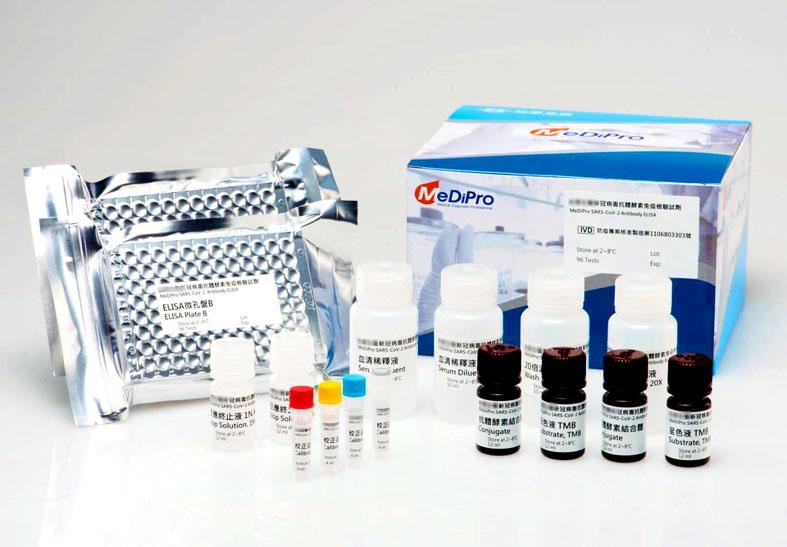A rapid COVID-19 antibody detection kit developed by researchers at Chang Gung University has received an emergency use authorization, paving the way for mass production, the university said on Thursday.
The test kit, which Chang Gung Memorial Hospital helped develop, was authorized on March 5 by the Food and Drug Administration, the university said in a statement.
The kit uses samples of blood serum to measure the potency of neutralizing antibodies in a person who has been vaccinated against COVID-19 and can produce results with 90 percent accuracy in one-and-a-half hours, it said.

Photo courtesy of Chang Gung Memorial Hospital via CNA
Linkou Chang Gung Memorial Hospital deputy superintendent Chiu Cheng-hsun (邱政洵) said that the tests would be vital until the world reaches herd immunity to COVID-19, as they can confirm whether a person is adequately protected from infection.
For example, if people arriving in Taiwan were to present a negative polymerase chain reaction test, proof of vaccination and also show that they have neutralizing antibodies, it would offer a high degree of certainty that there was no risk of them spreading or contracting the virus, Chiu said.
In such a scenario, it would be possible to consider shortening or even removing quarantine requirements for arrivals, which would help the country reopen its borders and resume international exchanges, he said.
Shih Shin-ru (施信如), director of the university’s Research Center for Emerging Viral Infections, said that the traditional method of testing for neutralizing antibodies involves placing blood serum along with virus-infected cells to evaluate whether the virus has been suppressed.
The entire process takes three to five days, and as it involves the cultivation of viruses, has to be carried out in a lab rated biosafety level 3, Shih said.
Biosafety levels are used to identify the protective measures needed in a laboratory setting to protect workers, the environment and the public.
However, the university’s test kit, which uses a specialized protein to detect the antibodies, can be used in any laboratory, Shih said.
The kit’s technology has been licensed to Formosa Biomedical Inc, and mass production would start soon, the university said.

Taiwan’s Liu Ming-i, right, who also goes by the name Ray Liu, poses with a Chinese Taipei flag after winning the gold medal in the men’s physique 170cm competition at the International Fitness and Bodybuilding Federation Asian Championship in Ajman, United Arab Emirates, yesterday.

Costa Rica sent a group of intelligence officials to Taiwan for a short-term training program, the first time the Central American country has done so since the countries ended official diplomatic relations in 2007, a Costa Rican media outlet reported last week. Five officials from the Costa Rican Directorate of Intelligence and Security last month spent 23 days in Taipei undergoing a series of training sessions focused on national security, La Nacion reported on Friday, quoting unnamed sources. The Costa Rican government has not confirmed the report. The Chinese embassy in Costa Rica protested the news, saying in a statement issued the same

A year-long renovation of Taipei’s Bangka Park (艋舺公園) began yesterday, as city workers fenced off the site and cleared out belongings left by homeless residents who had been living there. Despite protests from displaced residents, a city official defended the government’s relocation efforts, saying transitional housing has been offered. The renovation of the park in Taipei’s Wanhua District (萬華), near Longshan Temple (龍山寺), began at 9am yesterday, as about 20 homeless people packed their belongings and left after being asked to move by city personnel. Among them was a 90-year-old woman surnamed Wang (王), who last week said that she had no plans

TO BE APPEALED: The environment ministry said coal reduction goals had to be reached within two months, which was against the principle of legitimate expectation The Taipei High Administrative Court on Thursday ruled in favor of the Taichung Environmental Protection Bureau in its administrative litigation against the Ministry of Environment for the rescission of a NT$18 million fine (US$609,570) imposed by the bureau on the Taichung Power Plant in 2019 for alleged excess coal power generation. The bureau in November 2019 revised what it said was a “slip of the pen” in the text of the operating permit granted to the plant — which is run by Taiwan Power Co (Taipower) — in October 2017. The permit originally read: “reduce coal use by 40 percent from Jan.